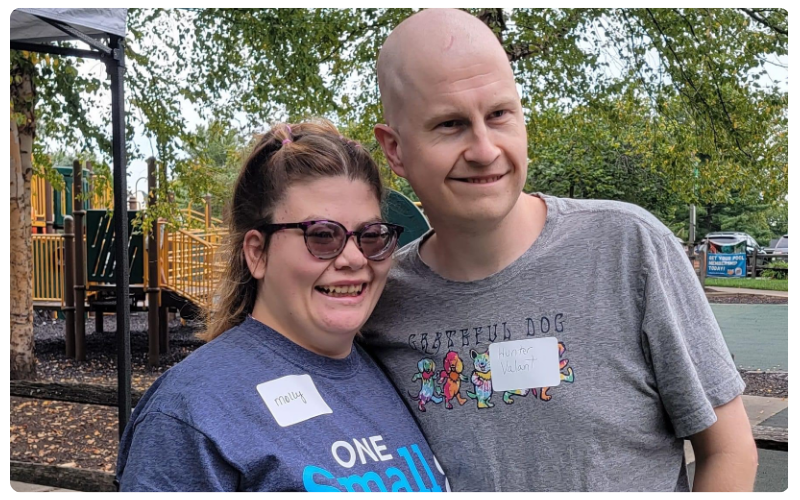2023 marks yet another record-breaking year in our pursuit of treatments for Prader-Willi (PWS) and Schaaf-Yang (SYS) syndromes. In this blog, we shine a spotlight on 10 research accomplishments from 2023, each contributing to a deeper understanding of PWS and SYS and bringing us closer to transformative treatments for our loved ones with PWS and SYS.
10 – Launched a New Database for PWS-CLIC Clinicians to Collect and Analyze PWS Patient Data
The PWS-CLIC database will allow expert PWS physicians to see trends across PWS clinical sites and will complement data collected in the Global PWS Registry, further accelerating the improvement of care for people with PWS. Curious if your physician is a member of the PWS-CLIC? A list of sites is available here >>
9 - Prepared Our First 100% FPWR-Funded and Executed Clinical Trial: VNS4PWS
The VNS4PWS clinical trial, now open and enrolling participants ages 10-40, will evaluate the safety and effectiveness of an external VNS device in treating behavior outbursts and temper tantrums in PWS. VNS uses brief electrical impulses to stimulate areas of the brain that are important for controlling emotions and behavior. The VNS4PWS clinical trial is the essential next step to making this treatment accessible to our community.

8 - Partnered With COMBINEDBrain to Establish a PWS & SYS Biorepository
Our newly established PWS and SYS biorepository will play a crucial role in future research by providing a centralized location for tissue samples and ensuring their long-term availability. In 2023, our partnership with COMBINEDBrain collected blood and urine samples from 21 people with PWS and 7 people with SYS. These blood and urine samples are now available to researchers across the world to support biomarker discovery and molecular investigations.
7 – Sponsored a Postdoctoral Researcher for 3 Years to Investigate the MAGEL2 Gene
FPWR has sponsored a postdoctoral researcher at Heidelberg University Hospital to investigate the MAGEL2 gene and develop resources to boost global PWS/SYS research efforts. This postdoc will be mentored by Dr. Christian Schaaf, the physician-scientist who first described SYS and who has been leading scientific study in this disorder for the past decade, and, among other things will work to understand the epigenetics of MAGEL2 and evaluate the feasibility of epigenetic interventions.

6 – Published Recommendations for Improving the PWS Clinical Trial Experience
To help improve clinical trials and the clinical trial experience, FPWR interviewed study site clinicians and caregivers of trial participants to gather insights and recommendations for improving clinical trials. Our findings have been published and shared with researchers and pharmaceutical companies who are interested in working in the PWS clinical trial space, with the goal of eliminating barriers to trial participation. You can read the recommendations here >>
5 – Identified 3 Differences Between Typical Neurons and PWS Brain Cells
Knowing the differences between typical and PWS neurons is the first step to finding treatments that can fix the cellular deficits. Ongoing research has identified changes in PWS brain cells, which will form the basis of large-scale tests that can efficiently screen drugs to identify possible new treatments for PWS and SYS.

4 – Leveraged Data From the Global PWS Registry to Advance Our Knowledge of PWS
The PWS Registry continues to be an invaluable resource for the PWS research community. This year, data from the registry defined the age at which children are being diagnosed with PWS and helped researchers better understand endpoints for PWS clinical trials. Additionally, data infographics were published on: swallow studies, dental issues, and mental health therapies.
3 – Partnered With PWSA (USA) to Make the BOSS Social Skills Curriculum Available to Teens and Adults With PWS
The Building Our Social Skills (BOSS) curriculum, empowers teens and adults with PWS to enhance their social interactions and build meaningful connections, thereby reducing loneliness and social isolation. FPWR has partnered with PWSA (USA) to make BOSS social groups available for teens and adults with PWS!

2 – Invested $4.3M Into Cutting-Edge Research
With the support of our community, FPWR continues to grow our research programs. In addition to advancing our VNS4PWS clinical trial, in 2023 we supported 35 research investigations that will provide us with valuable insights and drive the development of potential therapies and interventions.
1 – Supported the Advancement of 24 Ongoing and Potential PWS Clinical Trials
Advancing new therapies for PWS and SYS is at the heart of everything we do. In 2023 we supported the advancement of 24 PWS clinical trials at various stages of development. Importantly, we continue to support Soleno Therapeutics whose drug candidate, DCCR, will be submitted to the FDA in 2024 for review and potential approval.
The work we do, the advancements we celebrate, and the hope we nurture are all made possible by the unwavering commitment and generosity of our supporters. We extend our gratitude to you for your crucial role in making these accomplishments a reality. Thank you for your continued support!





.png?width=800&height=300&name=Research%20Accomplishment%20Header%20(1).png)


